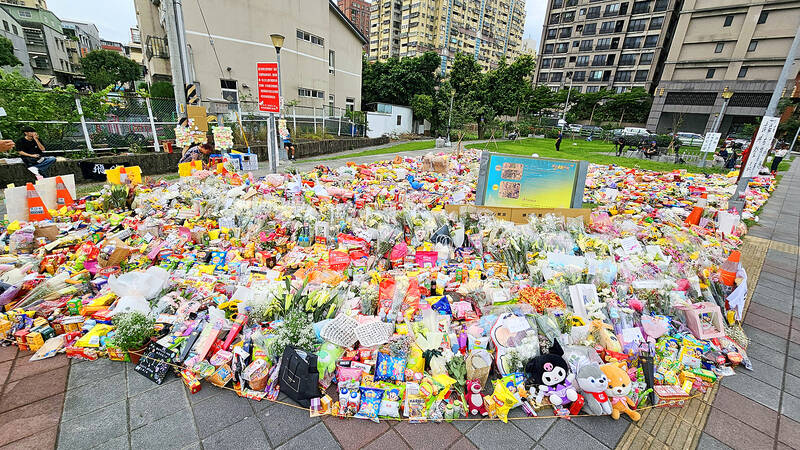Minister of Transportation and Communications Chen Shih-kai (陳世凱) yesterday pledged to deliberate for three months whether elderly drivers should be required to install advanced driver assistance systems (ADAS) in their vehicles.
Chen made the pledge at a meeting of the legislature’s Transportation Committee, in which lawmakers were scheduled to unfreeze the funding of the Ministry of Transportation and Communications, the Ministry of Digital Affairs and the Public Construction Commission.
However, the transportation ministry’s plan to lower the age for elderly drivers to renew their license from 75 to 70 came under scrutiny, which was proposed after a car driven by a 78-year-old man surnamed Yu (余) on Monday plowed into pedestrians, killing three people and injuring 12.

Photo: CNA
Elderly drivers who have contravened traffic regulations would be required to take safe driving training, and courses on hazard perception and road safety when renewing their driver’s license, apart from passing physical exams and cognitive tests.
Those who voluntarily return their driver’s license would receive a government subsidy when they purchase a TPass monthly pass.
Chinese Nationalist Party (KMT) Legislator Hung Meng-kai (洪孟楷) said that it is necessary for cars to be equipped with proactive protection systems.
Japan mandates that elderly drivers have unintended acceleration prevention devices and collision avoidance systems installed in their vehicles, Hung said.
The transportation ministry should consult the systems in Japan, Europe and Canada, where both new and old vehicles are required to be equipped with ADAS, Democratic Progressive Party (DPP) Legislator Lee Kun-tse (李昆澤) said.
The government should subsidize installation of the devices, Lee said.
All new vehicles are equipped with ADAS, but most elderly people drive older vehicles, Chen said, adding that the ministry would deliberate whether they should subsidize elderly drivers whose cars do not have ADAS.
The budget the transportation ministry needs to fund the subsidies is expected to be “enormous,” he said.
“Aside from subsidizing elderly drivers in purchasing TPass, some legislators also suggested that we subsidize elderly people’s taxi rides for a fixed number of times each month. We would take all these proposals into consideration in the next three months,” he said.
Chen in a news conference on Tuesday said that the transportation ministry would work with the Ministry of Health and Welfare to include required physical and cognitive tests for elderly drivers in the government-funded physical exams for elderly people.
Deputy Minister of Health and Welfare Lin Ching-yi (林靜儀) said that Chen’s proposal is not feasible, because it constitutes unauthorized use beyond the agreed-upon purpose of physical exams.
Retired National Taiwan University Hospital pediatrician Lee Ping-ing (李秉穎) said that it is irrational to lower the age threshold for elderly drivers to renew their driver’s license because of an isolated case.
Any risk-prevention measure must be backed by scientific evidence, Lee Ping-ing said.
The transportation ministry should compare the occurrence rates of traffic accidents among different age groups before engaging in discussions over a potential change, he said.
“To elderly people living in remote areas lacking public transport systems, subsidies for TPass might not be an effective incentive. Instead, it could limit their freedom to travel,” he added.
To address the issues of school zone traffic safety, the transportation ministry would work with local governments to speed up construction of walkways and discuss whether the speed limits in school zones should be identical across the nation, Chen said.

The Coast Guard Administration (CGA) yesterday said it had deployed patrol vessels to expel a China Coast Guard ship and a Chinese fishing boat near Pratas Island (Dongsha Island, 東沙群島) in the South China Sea. The China Coast Guard vessel was 28 nautical miles (52km) northeast of Pratas at 6:15am on Thursday, approaching the island’s restricted waters, which extend 24 nautical miles from its shoreline, the CGA’s Dongsha-Nansha Branch said in a statement. The Tainan, a 2,000-tonne cutter, was deployed by the CGA to shadow the Chinese ship, which left the area at 2:39pm on Friday, the statement said. At 6:31pm on Friday,

The Chinese People’s Liberation Army Navy’s (PLAN) third aircraft carrier, the Fujian, would pose a steep challenge to Taiwan’s ability to defend itself against a full-scale invasion, a defense expert said yesterday. Institute of National Defense and Security Research analyst Chieh Chung (揭仲) made the comment hours after the PLAN confirmed the carrier recently passed through the Taiwan Strait to conduct “scientific research tests and training missions” in the South China Sea. China has two carriers in operation — the Liaoning and the Shandong — with the Fujian undergoing sea trials. Although the PLAN needs time to train the Fujian’s air wing and

Taiwanese celebrities Hank Chen (陳漢典) and Lulu Huang (黃路梓茵) announced yesterday that they are planning to marry. Huang announced and posted photos of their engagement to her social media pages yesterday morning, joking that the pair were not just doing marketing for a new show, but “really getting married.” “We’ve decided to spend all of our future happy and hilarious moments together,” she wrote. The announcement, which was later confirmed by the talent agency they share, appeared to come as a surprise even to those around them, with veteran TV host Jacky Wu (吳宗憲) saying he was “totally taken aback” by the news. Huang,

The American Institute in Taiwan (AIT) put Taiwan in danger, Ma Ying-jeou Foundation director Hsiao Hsu-tsen (蕭旭岑) said yesterday, hours after the de facto US embassy said that Beijing had misinterpreted World War II-era documents to isolate Taiwan. The AIT’s comments harmed the Republic of China’s (ROC) national interests and contradicted a part of the “six assurances” stipulating that the US would not change its official position on Taiwan’s sovereignty, Hsiao said. The “six assurances,” which were given by then-US president Ronald Reagan to Taiwan in 1982, say that Washington would not set a date for ending arm sales to Taiwan, consult